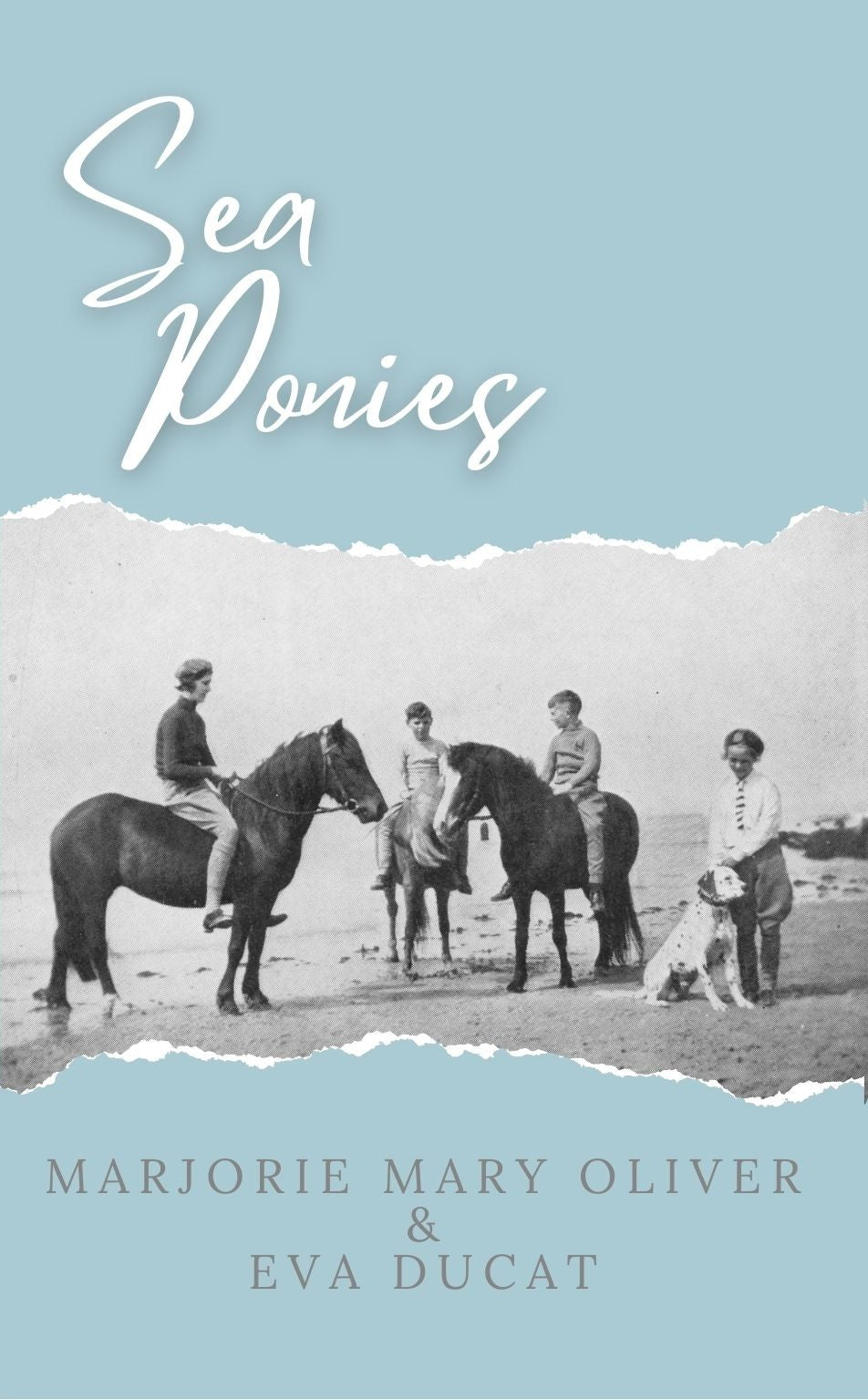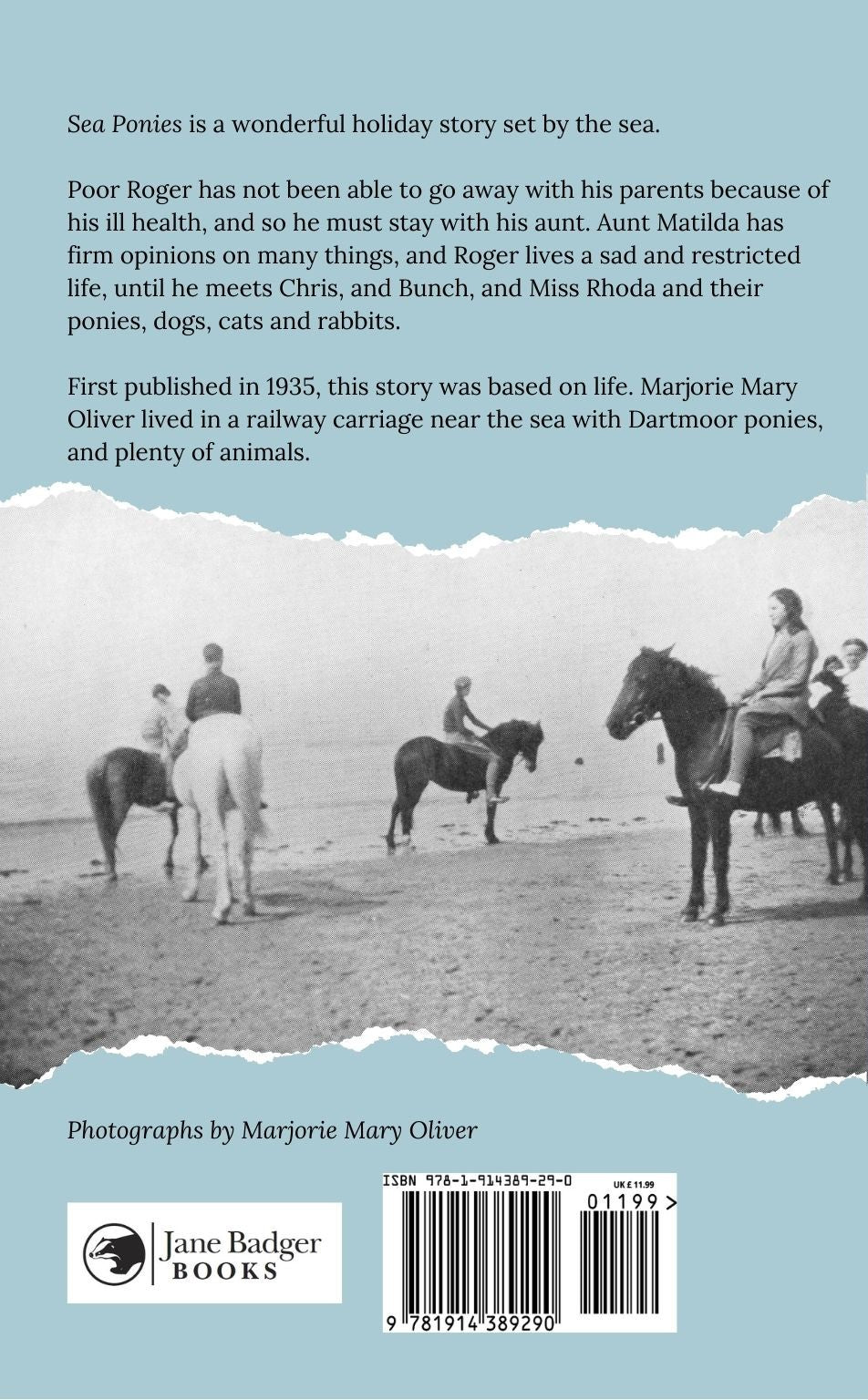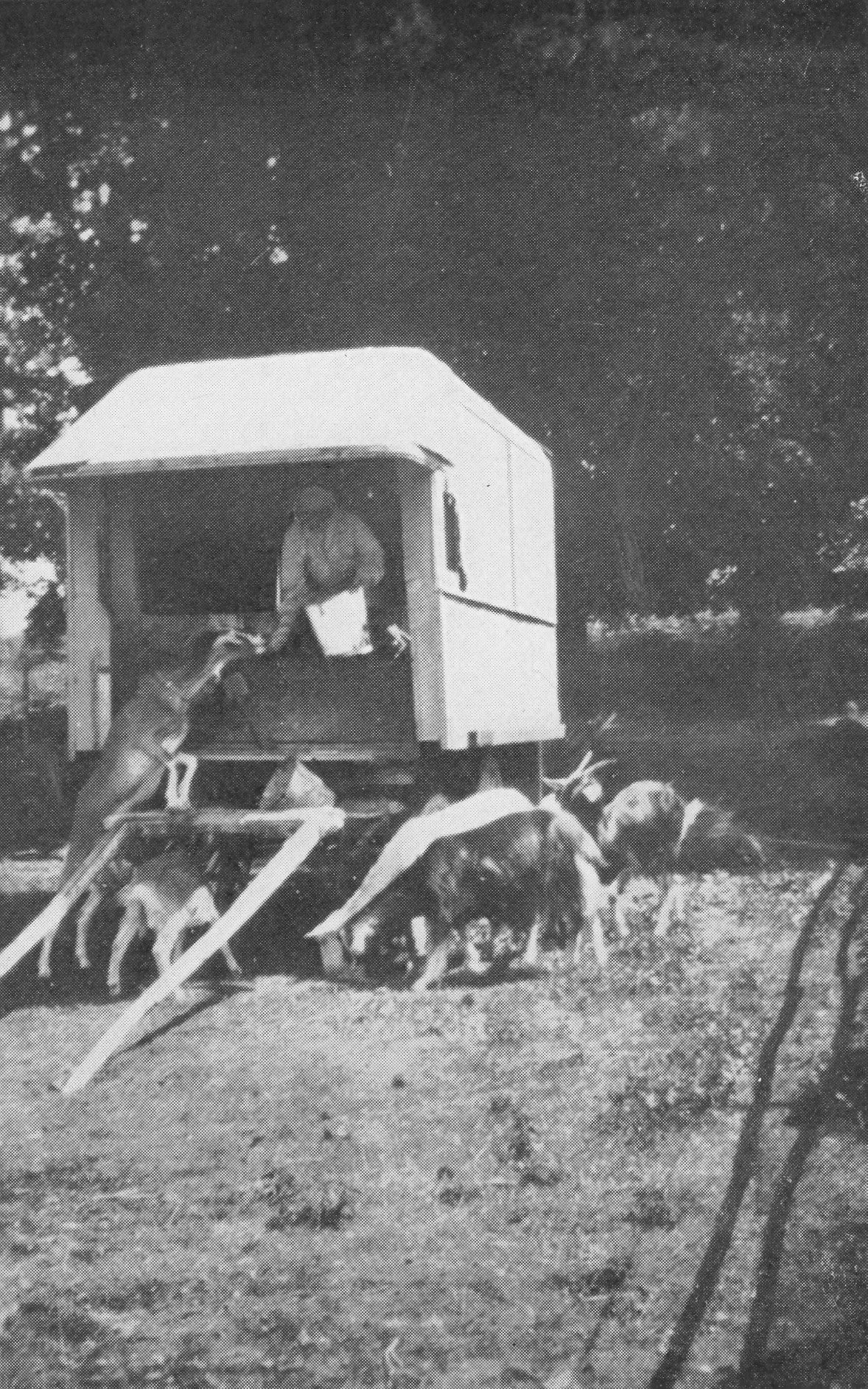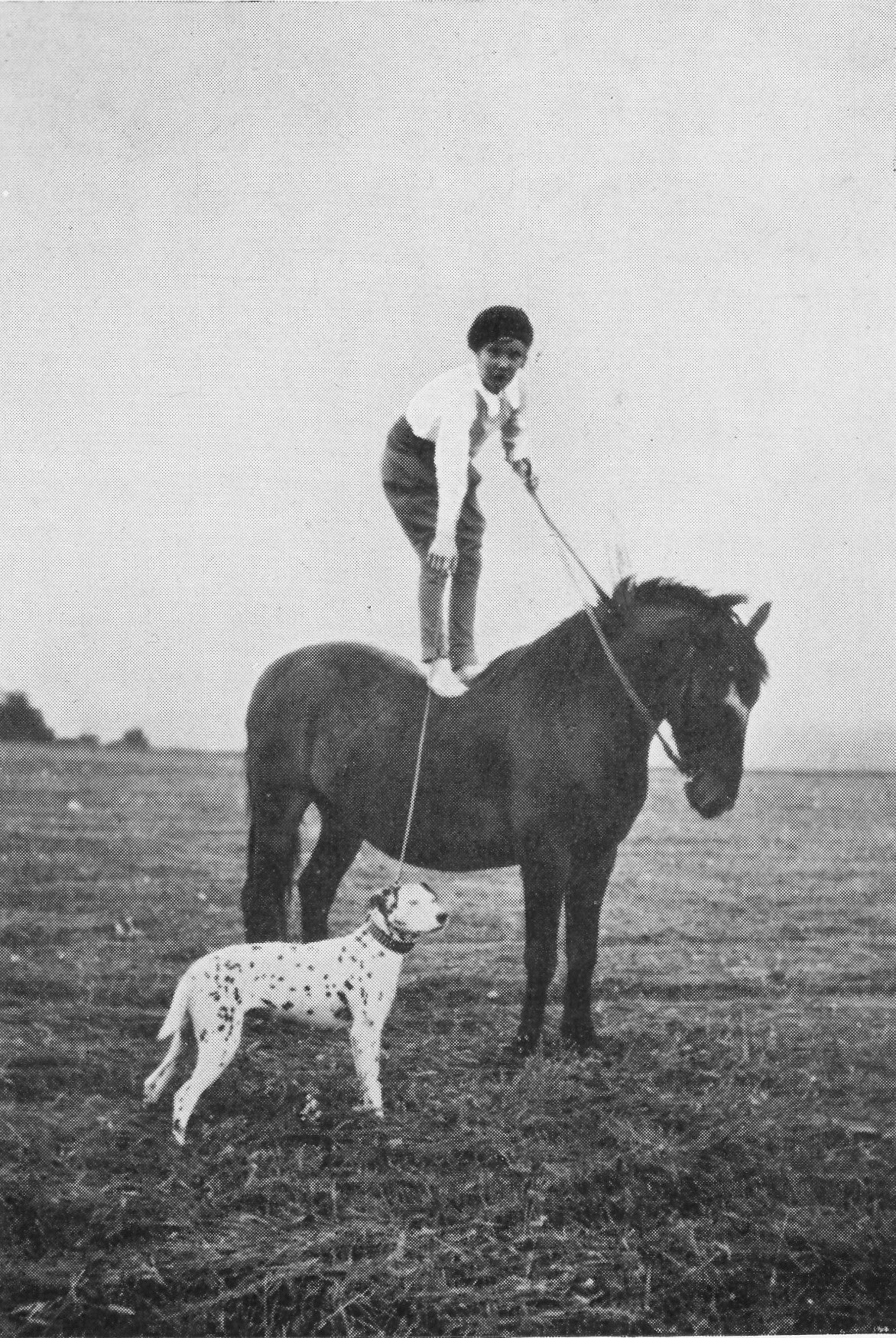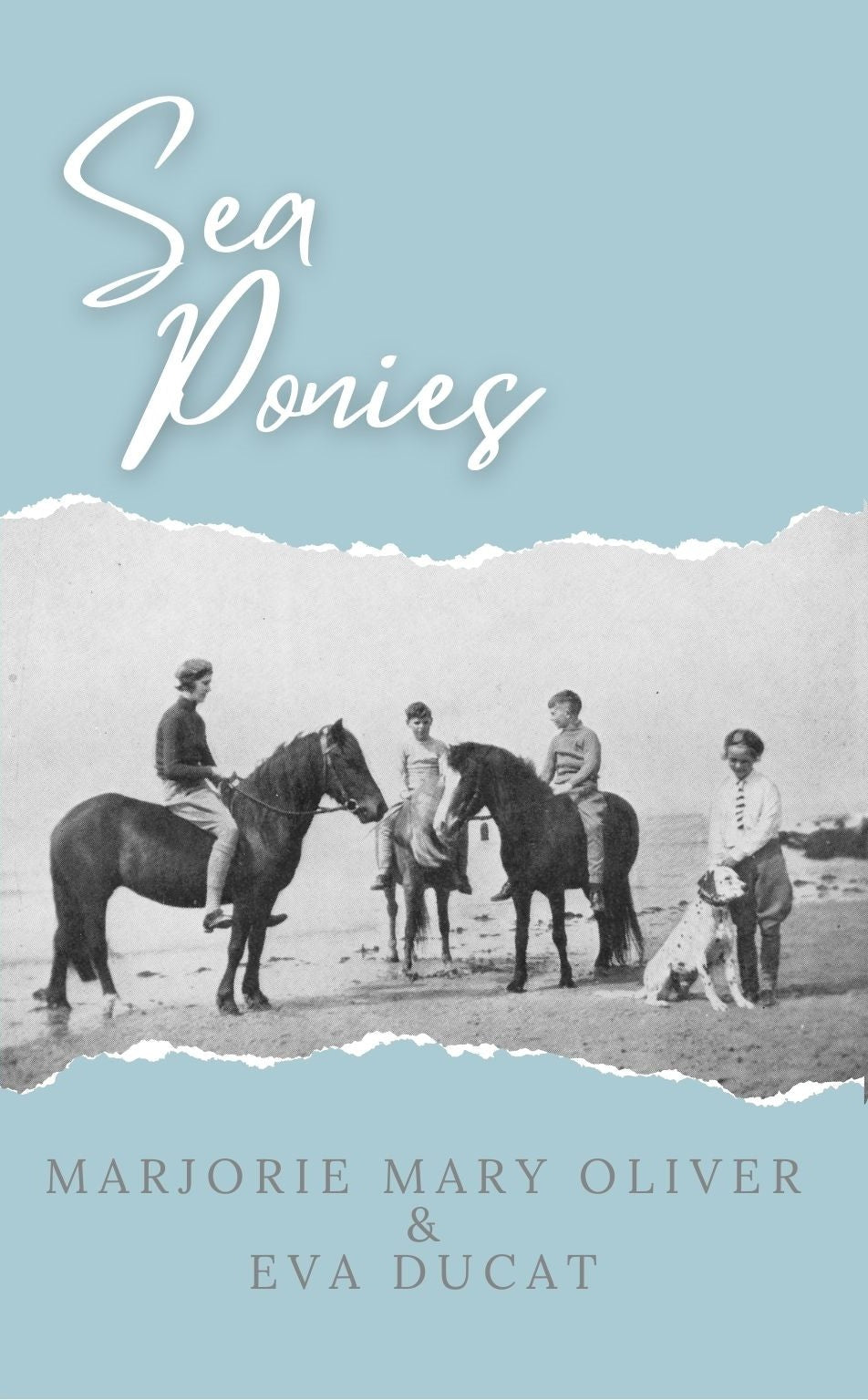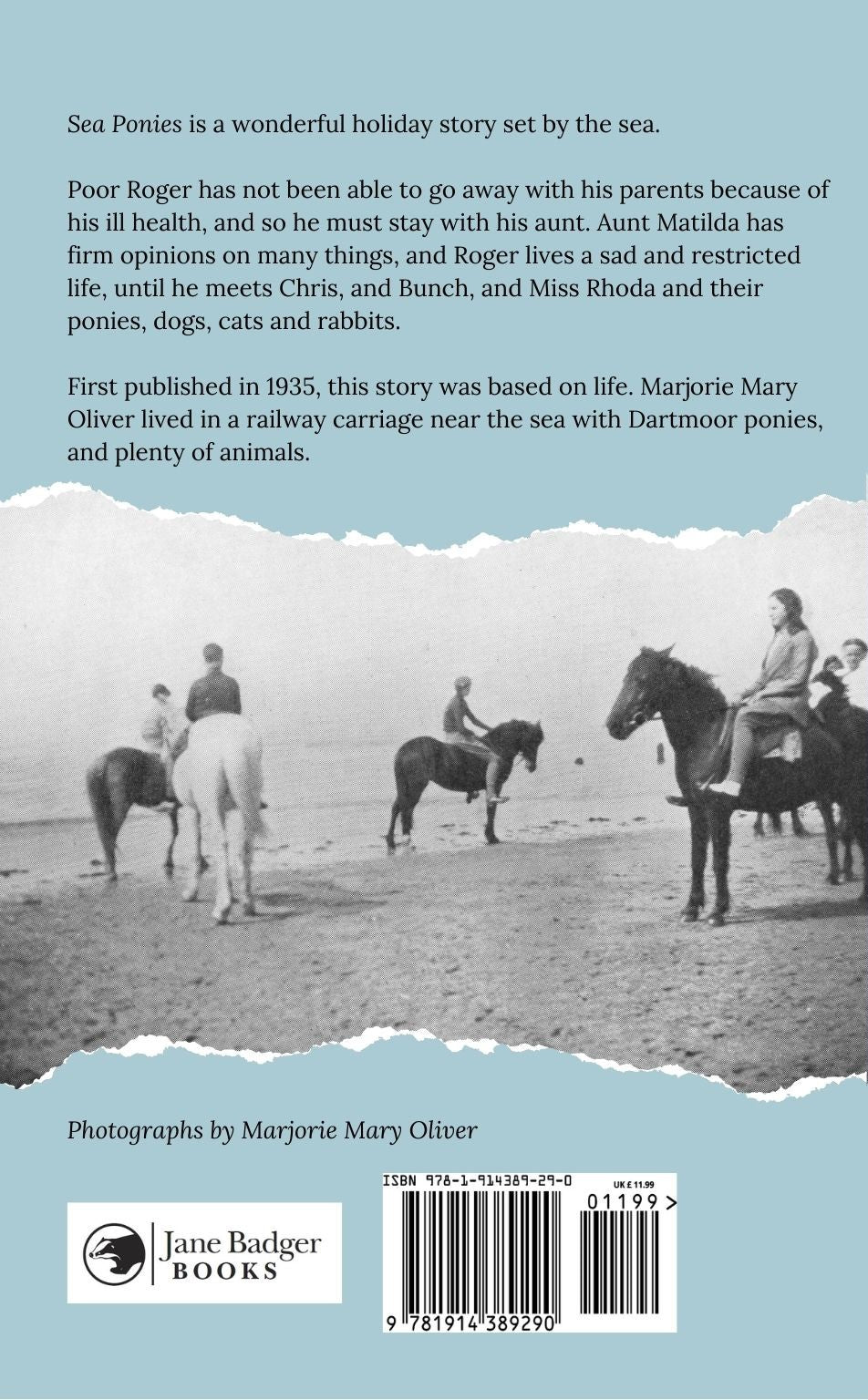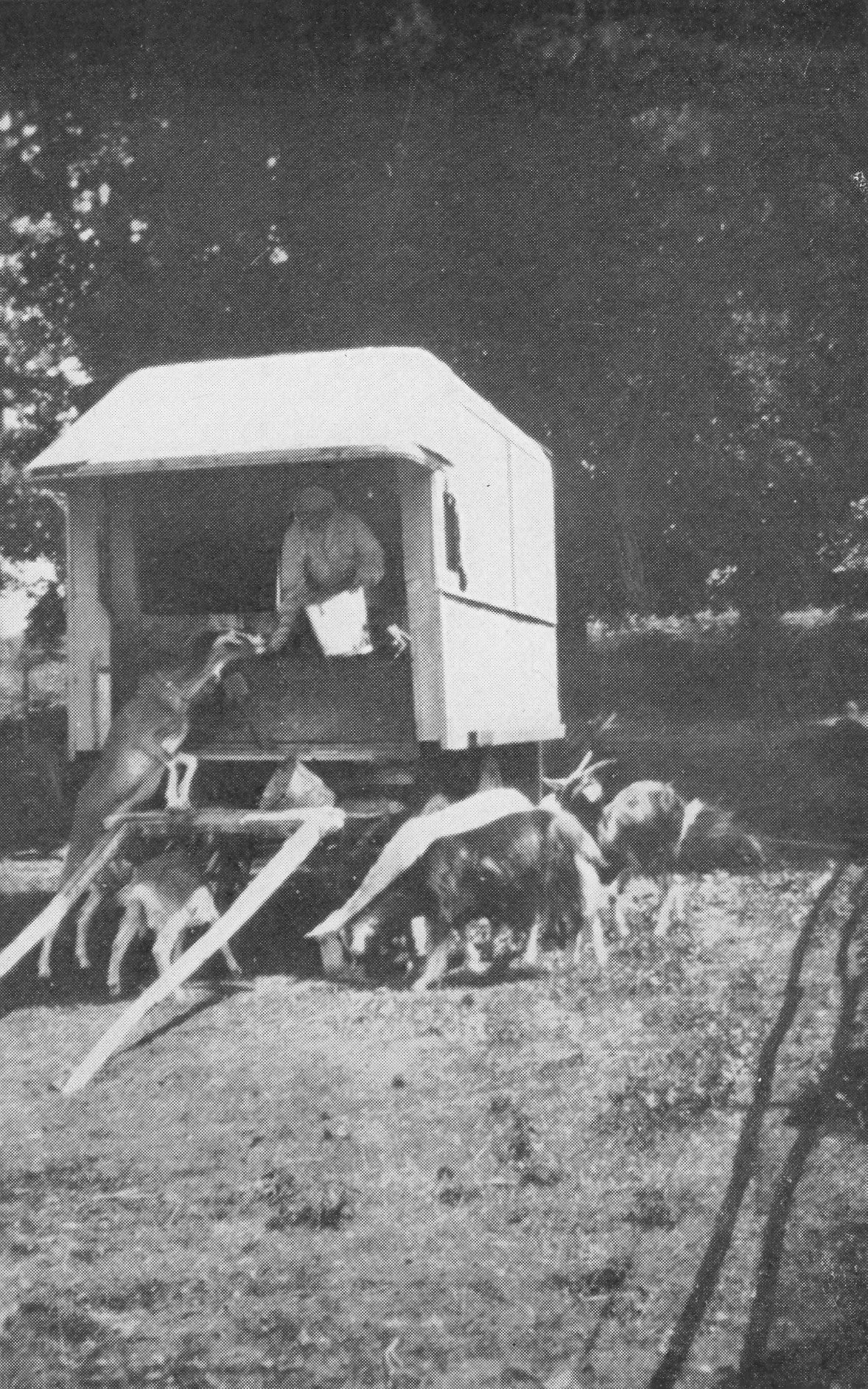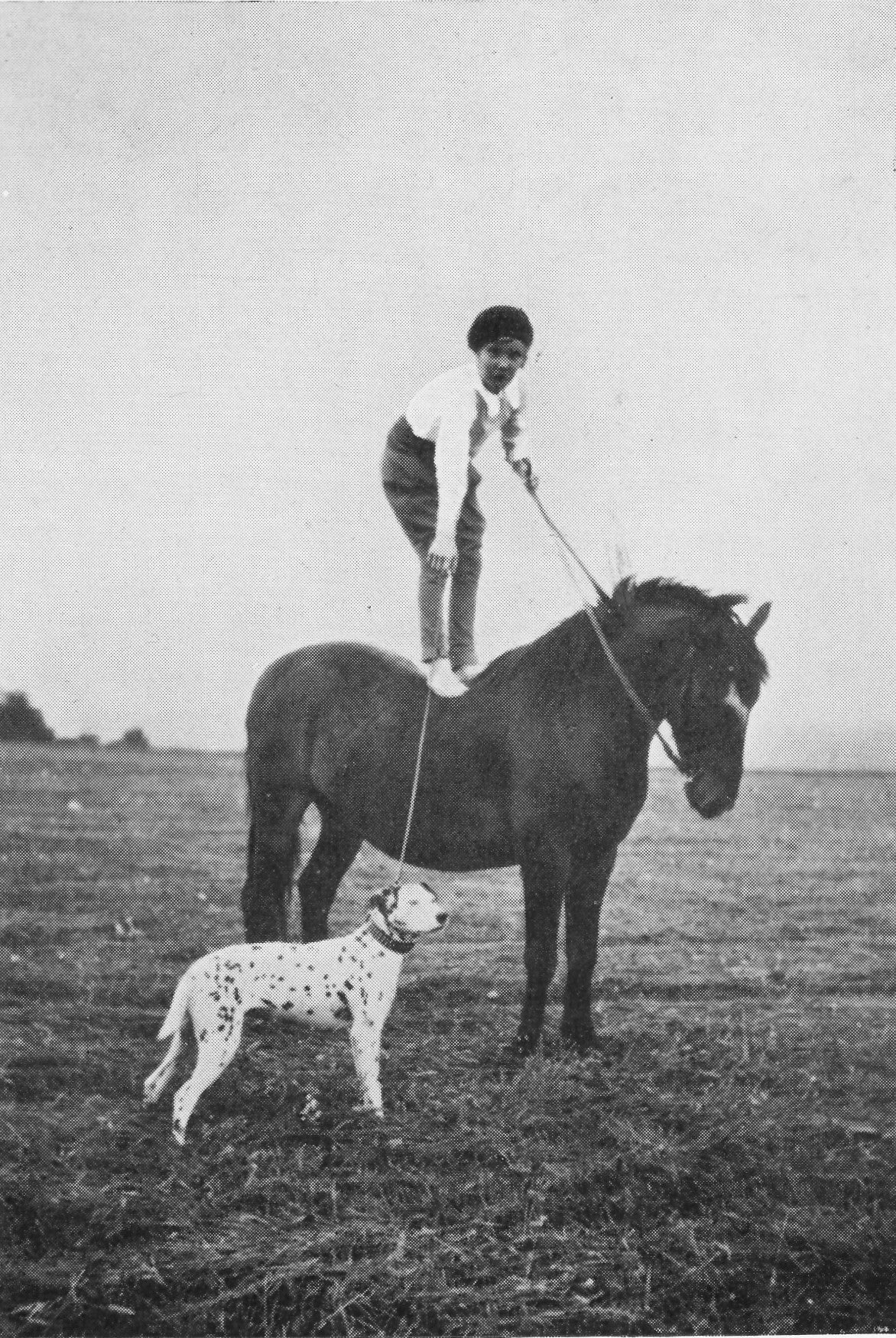Jane Badger Books
Marjorie Mary Oliver & Eva Ducat: Sea Ponies
Marjorie Mary Oliver & Eva Ducat: Sea Ponies
Illustrator: "Jenefer"
Couldn't load pickup availability
Share
Sea Ponies is a wonderful holiday story set by the sea. Poor Roger has not been able to go away with his parents because of his ill health, and so he must stay with his Aunt Matilda. Aunt Matilda has firm opinions on many things, and Roger lives a sad and restricted life, until he meets Chris, and Bunch, and Miss Rhoda and their ponies, dogs, cats and rabbits.
First published in 1935, this story was based on the life one of the authors lived on the Sussex coast, and it is illustrated with her photographs.
Bunts series 2
Page length: 212
Original publication date: 1935
When will I get my book?
When will I get my book?
Paperbacks are printed specially for you and sent out from our printer. They are on a 72-hour turnaround from order to being sent out. Actual delivery dates will vary depending on the shipping method you choose.
Read a sample
Read a sample
Aunt Matilda and Roger were staying at Lindon-on-Sea for a month. Every morning since their arrival Roger had been taken for a walk for the good of his health. His health had suddenly become a subject of great importance. Before the dreadful day when his mother and father had gone away to India he had been a merry, round-faced little boy full of laughter and high spirits, and no one had worried about him; but since he had gone to live with Aunt Matilda he had grown paler and thinner and had developed a listless moodiness which occasionally gave way to violent fits of temper.
It was most unfortunate for Roger that Aunt Matilda, though not old, was constantly fancying herself ill and was full of crotchets and fads about health. She could not bear Roger to run about with other little boys for fear he should get hot and then catch cold. She was nervous about draughts, fussy about damp, and inclined to make Roger wear more clothes than he wanted.
When she first noticed how pale and moody he was becoming she explained to her friends that he was one of those “difficult” children who would “grow out of it.” When it became apparent that he was only growing into it, she consulted a doctor, who advised an immediate change or he would not answer for the consequences. So they had come to Lindon-on-Sea, and the daily walks in Kensington Gardens and lessons with a tutor had been exchanged for daily walks in Lindon and, if the weather was fine, sitting on the shore with Aunt Matilda. He was never allowed to do anything amusing. Amusing things were always supposed to tire him, or give him a cold.
“Don’t shuffle your feet like that, Roger,” she said, as they walked up the long road to the station one morning on their way to change a book at the bookstall.
Roger at once proceeded to lift his feet so high that his knees nearly touched his chin with each step. Aunt Matilda endured this for some seconds, then she fulfilled Roger’s hopes by saying:
“Keep your feet down, Roger, and don’t make yourself so ridiculous.”
“But you told me not to shuffle my feet just now,” came Roger’s aggrieved protest.
“Don’t be foolish, Roger,” replied his aunt. It was a favourite injunction of hers.
Roger put on the sulky expression that was becoming habitual to him. He detested these morning walks, but was more hopeful than usual about this one as its objective was the station. Something exciting was always to be seen there. To begin with there were the trains, and once he had discovered a puppy in a box on the platform; he often found chickens and geese in crates, and on one memorable day there had been a calf, done up in a sack with a label round its neck. It had been a lonely little calf, and had acknowledged Roger’s sympathy by sucking his fingers. He remembered the thrill of that moment, and his resentment when he had been jerked away by Aunt Matilda, who said he “mustn’t touch strange animals.” His sulky expression deepened when he remembered this grievance.
“Come along Roger, and don’t dawdle behind like that,” said his aunt, who was always fussing after him.
He was just about to rush ahead as fast as he could so that she would have to call him back, when his eye was caught by something unusual at the top of the road.
Outside the station a tall boy, who looked about sixteen or seventeen years old, was standing beside a pony-cart with a fat white pony in the shafts, and behind was a little girl sitting on a dark brown pony.
Of all things in the world ponies seemed to Roger the most exciting. He had watched them in the park and had always longed to be close enough to one to stroke it.
As they drew nearer he saw that the little girl had no saddle, and beneath her short blue frock her slim bare legs hung down on each side of the pony. Both she and the boy were barefooted and hatless, and, as she looked at Roger, he immediately became very conscious of his thick woollen stockings, his large cloth cap, and the muffler which Aunt Matilda insisted on his wearing, although it was the last week in July.
A large grey sheep dog was lying in the road beside the cart, and he looked up with mild but friendly interest at Roger.
“You had better stay outside in the sun,” said his aunt. “The platforms are so draughty, you might catch cold.”
As the things outside the station this morning were so infinitely more alluring than anything he had ever found inside, Roger was only too glad to obey, but he writhed under the little girl’s stare of contemptuous surprise as she heard Aunt Matilda’s reason. Roger pretended to read one of the posters on the wall, but he knew that the little girl was still staring at him. She had very wide, scornful brown eyes, and she looked first at his stockings, then at his cap, and finally at his ridiculous muffler.
Roger longed to stamp his foot or burst into tears of rage. It was all he could do not to shout: “I don’t want to wear them! I hate them! I think they are as stupid as you do!” but he only continued to stare indifferently at the poster.
Suddenly there was a shrill whistle from an engine, and a train came into sight through the tunnel.
“Here they come!” cried the little girl, and with a sudden swift spring she stood upright upon the pony’s back.
Roger gave up any pretence at indifference and stared with all his might. He had never seen anything so exciting before. There she stood with her bare feet planted on the pony’s back, her slim blue-clad body poised unconcernedly, one hand shading her eyes as she watched the oncoming train, and her left hand still holding the reins, which were stretched to their furthest limit.
“Take care, Chris; Tag will probably shy at the train,” said the big boy with the cart.
Chris was obviously about to jump down when she caught sight of Roger’s admiring gaze fixed on her, and, with the tiniest toss of her brown curls, she remained as she was.
As the train came roaring and screaming into the station the brown pony gave one startled look at it and then swung round in a half circle. Chris swayed for a moment and then lost her balance. Roger cried “Oh!” in horror, and ran forward. The next moment Chris had dropped down astride the pony and was calmly pulling him back into place again. She had given one small gasp of relief at finding herself safe, but her eyes were as cool and scornful as ever when they met Roger’s, and he hated himself for having cried out.
“You’d better come and take charge of Snowball while I go and help with the luggage,” said the tall boy, “and don’t play any more silly tricks while I’m gone.”
“All right,” she answered; “and, Mike, do let them just come out and see me before they start fussing about luggage.”
She slipped off the pony, pulled the reins over his head, and unconcernedly took hold of the white pony’s bridle.
Roger tried to hide his astonishment at the sight of a girl, not much older than himself, holding two ponies at once.
As Mike walked towards the station the sheep dog rose to his feet and followed him, but when they reached the doorway Mike held up his hand and the dog instantly lay down. His attitude when lying beside Mike had been one of happy repose, but he now showed an anxious alertness. It is true he was lying down, as bidden, but it looked more as though he crouched, with every muscle taut, ready to spring up at a call. There was nothing restful either in his attitude or in his anxious faithful eyes as they gazed steadily at the door through which his master had gone.
Roger felt so sorry for him that he said, “Good dog. Come here, then,” and he snapped his fingers to coax the dog to him; but though Rob faintly wagged the tip of his tail in polite response he neither moved nor shifted his gaze from the doorway. Roger saw Chris’s scornful smile of amusement, and he felt that he hated her.
Just then there was a sudden stir and exodus from the station, and two figures hurled themselves upon Chris and the ponies. First came a little girl with a snub nose, very pink cheeks, and a mass of light brown curls which grew in a mop all round her head. She carried a covered wicker basket very carefully under one arm, and behind her came a sturdy little boy with merry eyes and a nose that turned up just like his sister’s.
The air was filled with a perfect babel of shouts. “Hullo, Chris!” “Hullo, Bunch!” “Hullo, Geoff!” “Oh, Tag, how lovely to see you again!” “And Snowball!” “And darling Rob!”
“Mike told Rob to stay there. That’s why he can’t come and say How-do-you-do to you,” explained Chris.
Rob was thumping his tail up and down to show his welcome, but he did not attempt to leave his post.
“I must get on Tag just to see how it feels to be on a pony again,” cried Geoffrey, vaulting on the pony’s back and little guessing the envy he was causing one watcher.
“And now, do let me see Benjamin,” begged Chris.
Bunch carefully lifted the lid of her basket, and a black-and-white rabbit peered out and then sat up on its hind legs and looked about.
Roger began to wonder if such things could really be. Fancy anyone travelling with a real live rabbit in a basket!
“I’ve got some oats for him,” cried Chris, and she drew a handful out of her pocket and held them out to Benjamin.
Tag, who was used to having this attention paid to himself, put up his soft nose and began eating them, but Benjamin did not seem in the least afraid of him, so Bunch lifted the rabbit up and he and the pony ate together out of Chris’s hand.
Whilst the three children were laughing together at them, Roger seized the opportunity to snatch off his cap and muffler and stuff them into his pockets, where they bulged out on either side.
Then he heard Bunch say: “Now Benjamin must say How-do-you-do to Rob,” and she came quite close to him with the rabbit.
Rob could not take his attention from the station doorway. It was evident that he did not for a moment trust Mike to look after himself properly. He thumped his tail hard when Bunch spoke to him and gave her one quick appealing look as though imploring her to understand that if only his mind were at rest about Mike there was nothing he should like better than to play with her.
Who's in the book?
Who's in the book?
Humans:
Roger, Aunt Matilda, Miss Rhoda, Chris, Bunch, Geoff, Mike, Mary and Tom Jackson, Mr Jackson
Equines:
Tag, Snowball, Rag, Tag, Bobtail, Sea-Kitten, Sunshine, Silver Cloud
Other titles published as:
Other titles published as:
Series order
Series order
1. The Ponies of Bunts
2. Sea Ponies
3. Ponies and Caravans
